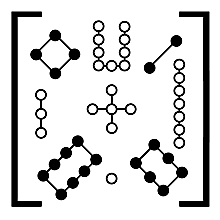Loshu.js is a linear algebra library for JavaScript. It not only provides convienient manipulation of matrices and vectors, but is also capable of more advanced operations such as matrix decompositions, eigenvalue and vectors, solution and approximation to linear systems, and many more!
(Optionally) accelerated using WebAssembly.
- Basic matrix and vector math: multiplication, inverse, norm, ...
- Matrix factorizations: QR, SVD, Polar, LDL, Cholesky, LUP, ...
- Solving linear systems: Gauss-Jordan elimination, Least squares approximation, ...
- Miscellaneous utilities: affine transformation, n-dimensional point/line/plane distance, ...
- Pretty print matrices
- Simple to use, documented interface
- Try it out in your browser with the online REPL
- Additional WebAssembly implementation for certain matrix math (C++ → emscripten) for up to 100x speed boost
To use the library, simply include the following to your html:
<script src="https://cdn.jsdelivr.net/npm/loshu/loshu.min.js"></script>To enable Web Assembly acceleration of some functionalities such as eigen(), inv() and svd(), include the loshuwasm.js script before loshu.js, like so:
<script src="https://cdn.jsdelivr.net/npm/loshu/wasm/dist/loshuwasm.js"></script>
<script src="https://cdn.jsdelivr.net/npm/loshu/loshu.min.js"></script>You will see a web assembly backend initialized message in console if the wasm module is detected. Otherwise you can manually turn it on using lo.options.usewasm=true.
You can also download the scripts from the links above and host them yourself, but you'll also need to download here the .wasm binary and put it in the same folder.
To use the library with node.js, download and require it like so:
const lo = require("./loshu")To enable Web Assembly acceleration of some functionalities such as eigen(), inv() and svd(), Download the wasm binary
as well as the wrapper and put them under the same folder. You will see a web assembly backend initialized message in the console.
let A = [[1,2,3],[4,5,6],[7,8,9]]; // matrix is just JS array (row major)
let B = lo.rand(3,3); // generate a 3x3 matrix of random values
let C = lo.mul(A,B) // array multiplication
let [U,S,V] = lo.svd(C); // singular value decomposition
lo.print(U,S,V); // pretty print the matrices
let l = lo.lsqfit([[0,0],[1,1],[2,1.9],[3,3.1]],{order:1}) // fit a line to data points
lo.print(`y = ${l[0].toFixed(2)} + ${l[1].toFixed(2)} x`); // display the line equation
let M = lo.affine('roty',Math.PI/4); // create a 45° rotation matrix around y axis
let u = [1,2,3]; // some vector
let v = lo.transform(M,u); // apply the transformThe development of this library is largely inspired by the textbook, David Poole's Linear Algebra: A Modern Introduction.
Besides Wikipedia and Wolfram MathWorld, the following online resources have also been very helpful in explaining algorithms.
- http://pi.math.cornell.edu/~web6140/TopTenAlgorithms/QRalgorithm.html
- https://www.mathworks.com/matlabcentral/fileexchange/38303-linear-algebra-package
- http://buzzard.ups.edu/courses/2014spring/420projects/math420-UPS-spring-2014-buffington-polar-decomposition.pdf
- http://webhome.auburn.edu/~tamtiny/lecture%2010.pdf
- https://www.cs.cmu.edu/~venkatg/teaching/CStheory-infoage/book-chapter-4.pdf
- http://math.mit.edu/~gs/linearalgebra/ila0403.pdf
